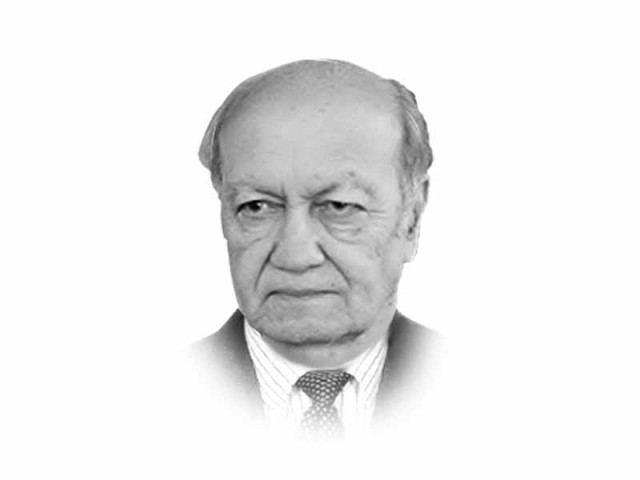International dimensions of Afghan war
Regional and global cooperation is the only way to strengthen the hands of Afghan government

The writer is a retired lieutenant general of the Pakistan Army and a former federal secretary. He has also served as chairman of the Pakistan Ordnance Factories Board
The US looks at Pakistan through the Afghanistan prism, setting aside the country’s intrinsic importance. Continually accusing it rather unfairly that Pakistan is not doing enough and the Haqqani Network and Taliban Shura are using its territory to launch attacks in Afghanistan. It has suspended economic assistance and adopted other coercive measures. However, realising that the logistic lifeline to Afghanistan passes through Pakistan and it can play a critical role in stabilising the region it will only go that far. Pakistan’s military leadership is willing to cooperate with the US provided it gives sufficient weightage to its security concerns as related to India and deals sternly with anti-Pakistan militant groups residing in Afghanistan. The Chabahar route is not available to the US due to its hostility towards Iran.
Apparently, there are two schools of thought among Trump’s advisers, one favouring a hard line and the other a more balanced approach towards Pakistan. The recent changes in Trump’s cabinet, however, have brought hardliners John Bolton, a former ambassador and Fox News commentator, as his national security adviser and CIA Chief Mark Pompeo, a Trump loyalist, as secretary of state. How these new appointments will play out will be carefully watched. But going by past records of these appointees a tougher approach by the US is expected that may not be in the interest of peace. This also negates lessons learnt over the years that military victory against the Taliban in the current circumstances is not possible. Even the recent increase in the US military personnel and greater use of firepower have failed to achieve any substantive progress in Afghanistan and the military stalemate continues, with nearly 40% of territory not in the control of the Afghan government. Civilian casualties have also grown as a consequence creating resentment and affecting support for the government in certain segments of society.
The deteriorating security situation in areas bordering Pakistan have resulted in substantial decrease in trade with Afghanistan and allowed India to take advantage by further expanding its trade and influence. Moreover, weakening of the writ of state in these areas has given a huge boost to drug trafficking. Afghanistan today ranks as the foremost producer of opium, with its adverse consequences for society and on the adjoining states especially Pakistan and Iran.
The Saudi-Iranian confrontation has had its impact on Afghanistan. The Saudi government is apprehensive of the growing Iranian influence in Afghanistan and wary of the role they would play in peace negotiations. Nevertheless, Afghanistan has to steer its relations with both countries with great sensitivity. Iran, besides strategic and economic considerations, is interested in the safety and wellbeing of the Hazara and large Shia community that constitute the Tajiks. Iran has been opposed to the Taliban but realising that they are a reality has developed contacts and supports their staunch opposition to US military presence.
The Chinese primarily have an economic interest in Afghanistan and have for several years been engaged in mining of minerals and other commercial activities. But realising the danger that the security situation poses to the western region constituting Uighurs and other militant groups China remains keenly interested in Afghanistan’s stability. Its adverse fallout could affect the full potential of the CPEC project.
Beijing also is not certain of American designs in the region. There is a perception in certain quarters that the US would like to prolong its stay in Afghanistan to remain in the vicinity of its strategic rivals and opponents — China, Russia and Iran. It would probably also facilitate the US to watch nuclear and missile developments in Pakistan. Considering that the US has sufficient technical prowess in the form of satellite imagery, listening devices and ground operatives the question arises: Does it really need to be physically present in a dangerous zone? However, the US would certainly not like to leave Afghanistan in a chaotic state for the Taliban and Da’ish to prevail and build it as their stronghold. At the same time development and nation-building in such anarchic conditions is not feasible. Moreover, President Trump has categorically stated that nation-building is not what Washington is aiming at. The Europeans and Chinese may have a different approach and would prefer to invest in development for they know that without it Afghanistan will remain in perpetual turmoil. It would also not be incorrect to presume that European countries, like other nations, are fatigued with their prolonged involvement.
Russia has a strong interest in the stability of Afghanistan as its spillover effect could undermine peace in neighbouring republics or autonomous regions, especially those dominated by the Muslim population and minorities. Although at the tactical level due to the current state of hostile relations over election meddling, annexation of Crimea and nuclear and missile build-up, the Russians would prefer that the US remains bogged down in Afghanistan.
It is thus becoming increasingly clear that regional and global cooperation is the only way to strengthen the hands of Afghan government and bring the Taliban to the negotiating table. For this to happen, Pakistan and India need to stop using Afghanistan to fight their proxy wars. And the US must get over the false assumption that it can achieve its political and strategic objectives in Afghanistan through the military might alone. The Taliban, too, have to pursue the path of negotiations. They do not have the political wherewithal or widespread acceptance or experience of running a transformed Afghanistan.
Published in The Express Tribune, April 4th, 2018.
Like Opinion & Editorial on Facebook, follow @ETOpEd on Twitter to receive all updates on all our daily pieces.















COMMENTS
Comments are moderated and generally will be posted if they are on-topic and not abusive.
For more information, please see our Comments FAQ